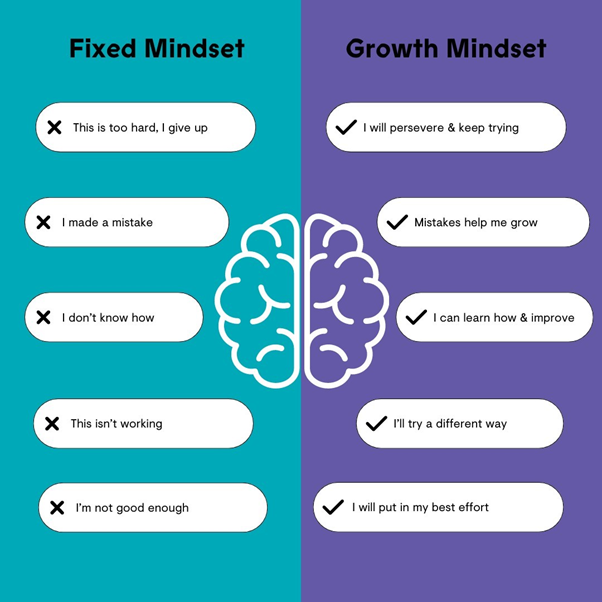Mindsets

When challenges arise or when we suffer an unwanted setback of some kind, one of the most impactful areas we can focus on is our mindset. Mindsets are formed through a combination of personal experiences, upbringing, and social influences. From a young age, the messages we receive from parents, teachers, and peers play a significant role in shaping how we view ourselves and our abilities. As we grow older, these early influences are reinforced by feedback from our environments; schools, workplaces, and social circles, further shaping how we perceive challenges and learning opportunities.
A fixed mindset is the belief that abilities are static and cannot be changed. This can limit our personal growth, as individuals may avoid challenges for fear of failure or criticism. Growth mindset is the belief that abilities can be developed through effort, learning, and perseverance. In the workplace, when a growth mindset is adopted, it helps us embrace challenges, see failures as opportunities to improve, making us more likely to take on tasks that stretch our skills. This not only enables innovation but creates an environment where collaboration thrives. In our personal lives, a growth mindset encourages personal development, openness to feedback, and resilience in relationships, helping us navigate challenges and continually grow.
Self-compassion mindset, which involves treating ourselves with kindness and understanding, especially in the face of mistakes, is also worth exploring when things don’t go as we would have liked them to. In the workplace, adopting this mindset can reduce stress and burnout by allowing us to bounce back from setbacks without harsh self-criticism. Over time our inner critic dissipates when we practice adopting this mindset allowing us to be more compassionate with others, as we can see the benefit of a less judgemental approach. At home, self-compassion promotes emotional wellbeing and improves relationships, encouraging empathy, patience, and a positive sense of self.
Appreciative Inquiry (AI) is a strengths-based approach that focuses on identifying and amplifying what works well, rather than fixing problems. It encourages positive inquiry to inspire growth.
Key appreciative strategies include:
1) transforming problems into possibilities and reframing threats as opportunities;
2) recognising the strengths and successes of individuals, groups, and organisations; and
3) fostering curiosity while reducing judgement.
These strategies help us shift to a growth-oriented, strengths-based mindset. AI can be applied in everyday practices such as enhancing relational energy, building high-quality relationships, improving emotional and mental health, developing strengths, and contributing to the wellbeing of others.
Our mindsets are flexible and with practice, can be changed over time. A key part of developing positive mindsets is allowing yourself time to reflect, whether it be following a difficult conversation or the completion of a project.
- Where can you identify the opportunities for growth and learning?
- How do you feel about how the outcome?
- What were the positive take-aways? (e.g. new connections, new skills)
- What is your ‘inner critic’ saying to you about the outcome?
Reflecting in this way can help us move away from focusing solely on the outcomes but recognise our effort and be proud of what we have accomplished.
You can learn more about Teaching a Growth Mindset here: Teaching a Growth Mindset - Carol Dweck (youtube.com)
Growth Mindset Toolkit (Folder)
